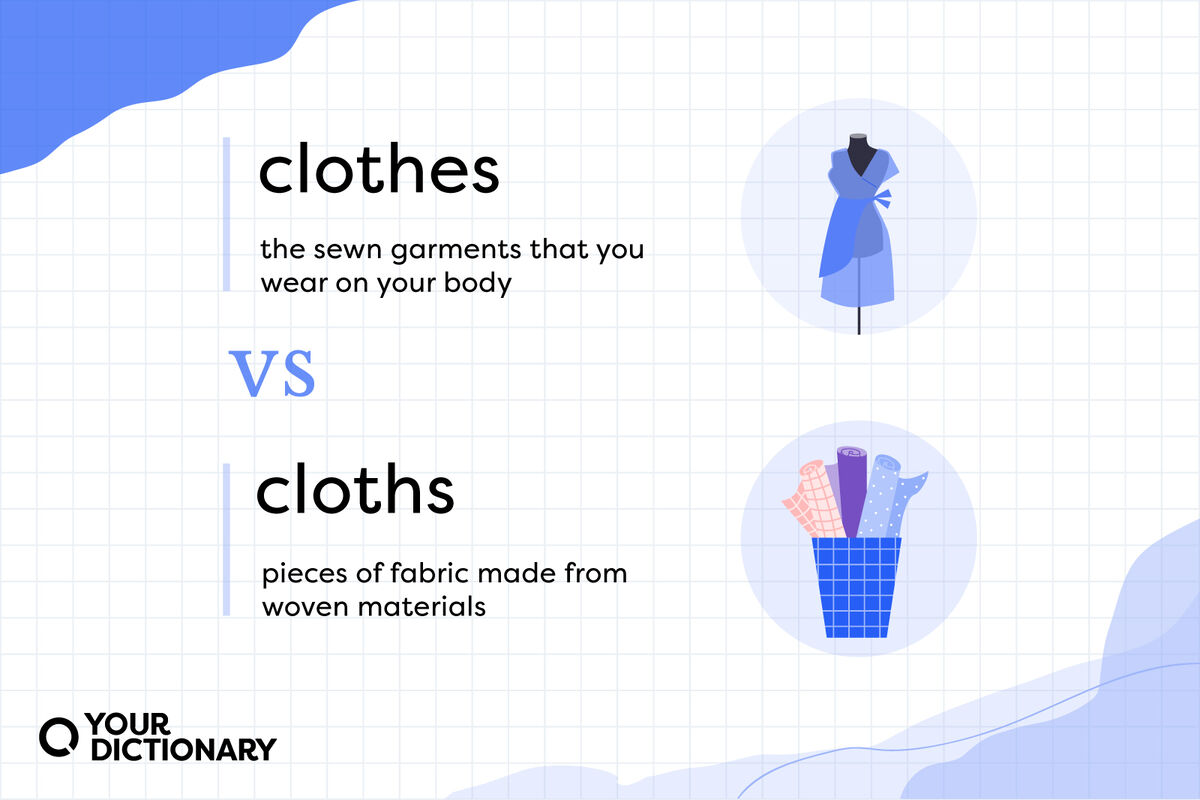
Wearing fancy clothes to a party is very different from wearing fancy cloths. One will get you lots of compliments and admiration; the other may result in confused whispers and mentions of Cinderella. Double check your wardrobe — and your spelling — with a quick review on cloths vs. clothes.
Definition of "Clothes": What You Wear
Clothes (klohthz) are the sewn garments that you wear on your body. Pants, shirts, dresses, tuxedos, skirts, shorts, and vests are all examples of clothes.
Like pants and scissors, clothes is a plural, uncountable noun that has no singular form. It refers to everything you’re wearing at once.
- Tina needs a bigger suitcase for all her clothes.
- I love buying baby clothes for my nephew.
- She always wears trendy clothes and cute shoes.
- The boy’s clothes are covered in mud.
How Do You Pronounce “Clothes”?
Say clothes out loud. Does it rhyme with loathes (/th/ in the middle) or close (silent /th/)? It depends on your regional dialect and how quickly you speak.
Most English speakers just skip the /th/ altogether and pronounce it close, which is fine. Just don’t spell it that way when you’re writing it; regardless of pronunciation, you should always spell clothes with a “th” in the middle.
“Clothing” and “Clothes” Are Synonyms
The word clothing is the present participle for the verb clothe, which is why it ends in -ing (“She’s clothing her dolls”). But it’s more commonly used as a noun that’s synonymous with clothes. In fact, clothing is slightly more popular than clothes.
You can use either clothing or clothes when talking about what you wear, but clothing is a nice alternative when the next word in the sentence begins with an “S” (since clothes ends with an “S” as well).
- There’s a clothing store next to the ice cream shop.
- Did you see all the clothing Sarah bought?
- I have to pack clothing, shoes, and accessories.
“Clothe” Is a Verb
Clothe (klohth) is not the singular form of clothes. It has its own job: acting as a verb that means “to put clothes on.” When it appears in the present tense as clothes (“She clothes her dolls”), it’s a homograph with the noun clothes, but is pronounced with the /th/, not rhyming with close.
The past participle of clothe (clothed) is synonymous with dressed.
- The charity group feeds and clothes the needy in our city.
- Can someone please clothe that baby?
- She was clothed in a beautiful gown, covered in sequins.
Definition of "Cloths": Pieces of Fabric
Cloths (klawths) are pieces of fabric made from woven materials, such as cotton or wool. You can’t wear them unless they’re sewn together — then they’re clothes.
- What type of cloth is your dress made from?
- Let’s sew these cloths together to make a quilt.
- Make sure to wipe the silver with proper polishing cloths.
- Please put white tablecloths on all the tables.
Is “Cloth” the Singular Form of “Clothes”?
Cloth is not the singular form of clothes. It’s the singular form of cloths, meaning “one piece of fabric.”
If you want to talk about only one piece of your outfit, use piece of clothing, article of clothing, item of clothing, or just use the word you mean (“I love your shirt!”) — but don’t use cloth.
“Cloth” Can Be an Adjective
When describing the material of a noun, you can use cloth as an adjective to mean “made of fabric.”
- My new car has cloth seats.
- Mabel’s cloth coat kept her warm on the chilly autumn day.
- He wore a cloth hat that was lined with leather.
The Origins of “Cloths” and “Clothes”
Cloths and clothes look so similar because they used to be the same word. Originally from the Old English claþ meaning “fabric you wrap around yourself,” cloths was the proper spelling for clothing.
Cloth also used to mean “what a person in a specific profession wears,” like a uniform. That’s where the phrase man of the cloth comes from — the “cloth” is the robe a priest or religious leader wears.
However, it became difficult to tell when a writer was talking about fabric or what a person wore. Clothes became an alternative spelling and pronunciation, referring specifically to “the garments you wear,” around the 19th century. Soon it was the primary way to describe clothing, and continues to be so today.
How Can You Remember the Difference?
Still confused? Keep these tips in mind and you’ll never say cloths when you mean clothes again.
- Say clothing. Now say clothes and cloths. Only, clothes sounds like clothing, so use that one.
- Cloths looks and sounds like sloths — don’t wear sloths to the party.
- Would you wear a tablecloth to the ball? Or a loincloth? No. Wear clothes instead.